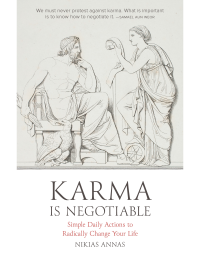The modern way of thinking assumes that everything that exists has a cause. This is the basic idea behind science: causality, or the relationship between cause and effect.
Cause and effect is not a theory or a belief, it is a law. As a law, it does not matter if you have heard of it, believe in it, or ignore it. Everything about you is subject to the law of cause and effect.
Laws manage everything that exists, and there is no more fundamental law than cause and effect.
Even gravity is a minor law in comparison with cause and effect. A few miles above the surface of the Earth, the power of gravity begins to fade. Yet cause and effect has no such boundary. It manages every existing thing, on every level, from the subatomic to universes.
Everything that exists depends upon cause and effect. There are no exceptions to cause and effect, though there are many cases where we lack the ability to perceive particular causes. Nonetheless, the law of cause and effect is universal.
According to all of our most ancient traditions, the universe arises and falls in cycles of birth and death. Just as we have days and nights, and seasons, all existing objects pass through cycles. On the scale of the universe, there are cosmic days and nights, great periods of birth, existence, death, and repose. Throughout the birth and death of worlds, suns, and cosmic systems, cause and effect is the law that balances everything. In other words, existence happens because of cause and effect. Without this law of cause and effect, existence would not be possible.
Yet, the law of cause and effect is not fixed or rigid like some kind of predetermined story, “fate,” or “destiny,” because such a law can only be set in motion when the conditions allow. A simple example is in the striking of a match to create a flame; without conducive conditions, the match will not light, such as underwater or if there is no oxygen. Likewise, on every level of existence, the conditions must be right for this law to be rendered active.
In traditions like Buddhism and Hinduism, which have studied this subject in great depth, the law of cause and effect is known as “karma.” The actual meaning of karma is poorly understood in the West, where people commonly associated it with some kind of debt to the universe or God. The real meaning of the Sanskrit term karma is “cause and effect,” or “action and consequence.” Karma is derived from the root word karman, which means “an act.” Every act is a cause for specific results. Thus, karma is just this: action and its consequences. Understanding this, we can naturally see that actions that produce beneficial consequences are just as “karmic” as actions that produce harm.
Nowadays, many people respond to this topic by leaping to its implications for the creation of the universe, or how it applies to natural catastrophes and other unique but interesting situations. While such subjects may be very compelling for debate or discussion, as they are currently beyond our ability to truly confirm or disprove, they are merely theoretical, and a merely theoretical or scholarly point of view is not very useful in daily life. Having an opinion or theory about the origin of mankind or the beginning of existence does not do much at all to help us with the problems that are afflicting us right now. Therefore, let us first understand karma personally, in our own life, as this kind of knowledge can render great changes that we can experience for ourselves.
Through action, we create results. Everything that we are now is a result of actions already taken. To be that which we aspire to be, we have to know what actions we need to take in order to produce the results we want. Moreover, we need to establish the conditions within which those actions, those causes, can bear fruit.
The human being has an infinite potential, yet to develop it one must know how. Nothing in the universe arises by chance or by a predetermined fate. Everything arises due to causes and conditions. To become a fully developed human being, we must perform the actions that engender such results. To do that, we have to understand exactly how karma works, and how to master it.
The first step then, is to reflect on our own experience with the four fundamentals of cause and effect. These fundamentals were very clearly explained by the great Tibetan master Tsong Khapa in his Lamrim Chenmo (Great Treatise on the Stages of the Path to Enlightenment); we will summarize them here.
1. The Certainty of Cause and Effect
Much—if not all—suffering occurs because of ignorance about cause and effect. By ignorance we do not mean a lack of book study or intellectual understanding, but to a lack of real knowledge. Real knowledge is cognizant knowledge. One only has to be burned one time to acquire genuine knowledge of the power of fire or heat. From then on, that knowledge cannot be ignored. Even if one has a strong desire whose fulfillment requires being burned (such as retrieving a cherished object from a raging fire), it is unlikely that one will be willing to be burned. And certainly, one would not take such pain for something unimportant.
Unfortunately, we lack this kind of knowledge regarding almost everything in life. We may believe it is wrong to lie, and though we have experienced the pain of being lied to, we continue to lie to others and to ourselves, because of ignorance: a lack of real knowledge—cognizant knowledge—of the consequences of lying.
A drunkard knows that alcohol is bad for him, but he continues to drink because he lacks cognizance—real knowledge— of the consequences of his drinking. Even having lost everything important to him in life—his family, career, social standing—he will continue to drink, because his desire is greater than his knowledge. In other words, he has not yet realized the inevitable relationship between action and consequence. He has no cognizance of karma.
For every action, there is a result. No matter how small or insignificant an action may seem, it will have consequences, even if we are unaware of them.
By actions, we mean not only what we say or do with our bodies, but also what we think and feel. Our internal actions can impact our external environment. The way we think and feel can be sensed by others, and can change their attitude towards us.
How many people have not been hired for a job, because the employer could sense the negative thoughts or feelings of the applicant? Even a well-qualified person will be rejected if they give off a bad atmosphere. An astute employer can sense a thief, a liar, or a person who cannot be trusted. There is no physical evidence for these impressions, but they are perceptible, because of our psychological environment. The state of our psychology can be sensed by others, thus what we think and feel has consequences.
How many good women have sensed the terrible, secret lust of an otherwise decent man, thus he remains alone? He may never show his lust externally, and only indulge in it in his mind, yet others can sense it.
What we think and feel, though it is “inside of us,” has an external impact that we generally ignore. Thus, our actions, whether internal or external, have effects.
Reflect on your own actions every day. Reflect on any action you intend to pursue. Be sure you have weighed the impact of every act, for once performed, it cannot be erased.
In every area of life, it is essential to recognize the certainty of cause and effect. Even if we do not immediately see the consequences of an action, the consequences will inevitably arrive as soon as the conditions are conducive—unless a more powerful action overpowers their emergence. We will talk more about this later.
Additionally, though we are not always able to perceive the relationship between cause and effect, it does not mean the relationship does not exist. However, it often happens that we do have the ability to see it, but we do not want to; much of the time, we are unwilling to see the truth. We prefer to maintain our illusions.
2. Effects Are Greater Than the Cause
Although most people think that an action produces an equal consequence, that is not true. A tiny seed grows into a plant many times larger, which produces more seeds and more plants. Thus, the original action—the seed—produces truly awesome results. Likewise, our actions develop consequences that are greater than the action.
A very simple example is to imagine throwing a stone into a pond. Most people think of cause and effect as merely being the relationship between the throw and the splash of water. Yet, when analyzed, there is much more occurring. The energy required to throw a stone is rather small, yet the impact of the stone results in a distribution of energy that is far, far greater than the original expenditure of energy. The splash is but the result of the initial impact of the stone on the water. But what about the waves created by the impact? On a still pond, the waves can extend for a very long distance, disturbing the entire pond; not just on the surface, but also towards the bottom, as well as any fish, plants, or other organisms, who might be terrified or disturbed. Moreover, such an action is not limited to just the material consequences; the sound also travels a long distance and creates an impact in a wide area.
Correspondingly, every action we perform has waves of impact that flow both outward and inward. Every action we perform also affects us inside, psychologically.
Numerous psychological problems (inside of us) are caused by the cumulative results of negative actions we performed externally. Yet, because we have never learned to pay attention to our actions and their effects, we are deeply ignorant of the full power of our actions.
The consequences are always greater than the action. This is true for negative actions and positive ones. If we plant the seeds of nourishing fruit, we can feed many people, for generations. Yet if we plant the seeds of selfishness, anger, or lust, we can originate harm on a scale that we can scarcely imagine.
How much greater the effects are than the originating action depends upon the conditions surrounding the action. A word spoken in solitude does not have much effect. But the same word spoken at just the right moment, in the right place, can change the world. In every case, the power of an action is determined by the conditions that surround it. Thus, it is necessary to not only contemplate well the type of action we want to perform, but the precise conditions needed to facilitate it. For instance, many people attempt to educate their children by relentlessly stating the same instructions over and over, yet the child continues to ignore the advice. To truly influence a child in the right way, those words could be spoken one time, if one knows the precise moment to do so.
3. You cannot receive the consequence without committing its corresponding action.
Actions produce corresponding consequences.
It is obvious that on the physical level in order to be nourished, you must eat. To live, you must breathe. To be clean, you must bathe. Similarly, to have spiritual insight, you must see for yourself; no one can do it for you.
Everything in nature works according to laws. Our spiritual development is subject to laws also.
Many people are deeply hypnotized by the desire to get something for nothing. Everyone wants to win the lottery or “strike it rich” without having to work for wealth. This is a foolish fantasy that originates enormous suffering. The fact is that nothing is free, and everyone receives exactly what they deserve, according to the causes they originated in the past.
“Be not deceived; God is not mocked: for whatsoever a man soweth, that shall he also reap.” —Galatians 6:7
In other words, whatever we have in life, we earned. Whatever we do not have, we have not earned.
If we want happiness, we have to produce the causes for happiness. If we want freedom, we have to produce the causes for freedom. That is, we originate our own future through our present actions.
Thus, it is wise to consider the consequences of each action we perform. What will be created by our anger? Certainly, anger cannot create peace, understanding, or contentment. Anger can only create anger, pain, and resentment. Angry people spread their anger to everyone else in their environment, and receive much more anger in return. Imagine an angry bus driver. The angry bus driver treats all the passengers poorly, thus everyone responds to the driver with irritation, anger, sarcasm, all of which naturally makes the bus driver more angry. A cycle is put in motion, and it feeds itself daily, getting stronger. A person who lives like this has a life filled with bitterness and complaints, always directed at others, blaming “the system” or “management”—but it all originated from themselves. Many people live their entire lives this way, whether with perpetuated anger, envy, lust, or other harmful qualities. Thus, such a person can never have what they want—respect, peace, contentment—because they had never acted in a way that resulted in those consequences.
You know it is true: if you smile at others, they smile back. This is karma in motion. Yet, mere “knowing it is true” is not the same as living it. We “know” many truths, but do not have cognizance of them. Cognizance is proven by our actions. If you want certain conditions in your life, you have to perform the actions that will create them. Suffering cannot be overcome through creating more suffering, yet that is what we attempt. Suffering can only be overcome by stopping the actions that create it.
4. Once an action is performed, the consequence cannot be erased.
Many people like to believe that they can “take back” mistaken acts, or have them “forgiven,” but it is an undeniable law that whatever is done is done, and cannot be painted over.
A hurtful word will change a relationship forever. Similarly, a moment of sincere generosity can change a life forever.
A child who encounters pornography will be forever changed. The images of lust will change the psychology of that child.
A child who experiences violence will never be the same. No matter how peaceful and fruitful the rest of that child’s life, the experience of violence can never be erased from the psyche.
Similarly, everything we do is permanent. The depth and influence of every action depends on many factors, but no action can ever be erased.
Nature has a type of memory that is eternal. So do we, but we ignore it.
Fortunately, any harmful action and its consequences can be overpowered. As grave as our suffering and problems may be, karma is also the power that can transform them into happiness.
There is a fifth fundamental aspect of karma that is implicit in every spiritual tradition, and was very clearly stated by Samael Aun Weor:
A superior law always overcomes an inferior one.
A stronger action overcomes a weaker one. This is the key to genuine happiness.
Through understanding how to utilize karma (action and consequence), all suffering can be overcome. Yes—all suffering.
Every enlightened being—no matter what name we use for them—reached that state by means of this fact: any circumstance (which is a result of previous actions) can be changed by performing superior actions. This is how we can understand the forbearance and incredible strength of all of our greatest spiritual examples: Jesus, Buddha, Krishna, Milarepa, Moses, Joan of Arc, and others. Their power to overcome adversity and suffering was rooted in a profound understanding of cause and effect: knowing how to perform the right action at the right moment in the right circumstances. This kind of accurate knowledge and its results are accessible to an awakened consciousness. By learning how to use our consciousness, we learn how to direct energy towards the circumstances we need. By discarding harmful actions and adopting beneficial ones, we can transform life.
Make it Practical
Tonight, sit upright in a comfortable place, and relax fully. Close your eyes, and review your experiences from the day.
Be impartial, like a scientist gathering data.
Try to remember as much as you can.
Do not get stuck on one moment to another. The general aim is to see how much you can remember, and also how much you cannot.
Do this for at least ten minutes every day. It is a small action, but if you plant this seed and care for it every day, it will grow and produce very nourishing and transformative fruit.







